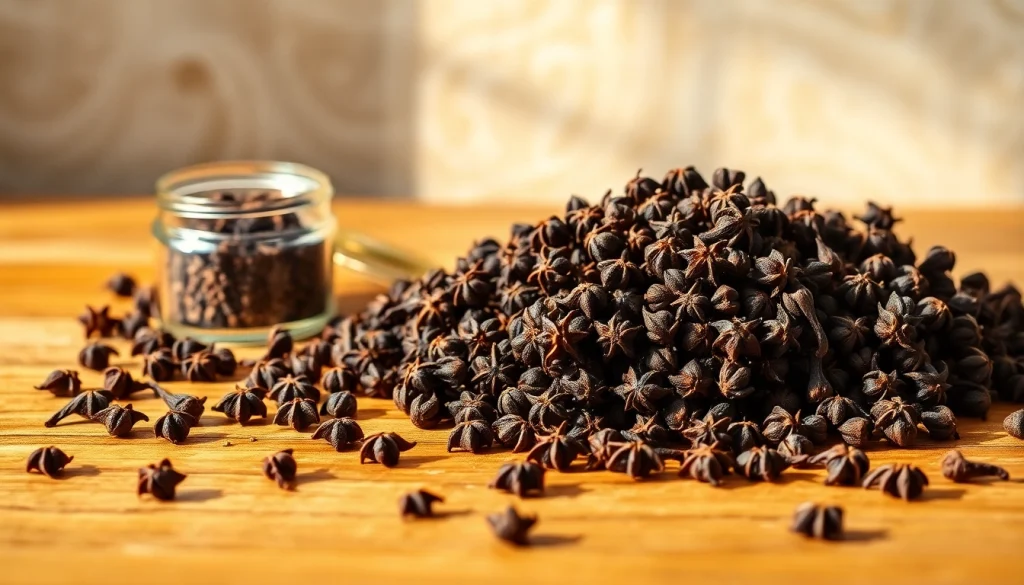
Understanding Cloves: Origin and Characteristics
What Are Cloves? An Introduction to Syzygium aromaticum
Cloves are the aromatic flower buds of the tree Syzygium aromaticum from the myrtle family (Myrtaceae). These dried flower buds possess a strong, spicy flavor and a distinct aroma, making them a favored ingredient in various cuisines and traditional medicines. Cloves are native to the Maluku Islands (Indonesian Archipelago) and have been utilized for centuries not only for their culinary uses but also for their medicinal properties. The flavor profile of cloves is complex, characterized by a warm, sweet, and slightly bitter taste with strong hints of eugenol, a compound responsible for many of their health benefits. This aromatic spice is an essential addition to spice blends, baked goods, and savory dishes alike. To discover more about their qualities, you can explore Cloves.
Origins and Historical Significance of Cloves
The history of cloves is as rich as their flavor. They have been a coveted spice since antiquity, primarily due to their unique flavor and potential medicinal benefits. Historical records indicate that cloves were amongst the highly traded spices in the ancient Spice Trade, sought after by empires for their preservative qualities and use in perfumes. The demand for cloves and their influence on international trade routes dramatically shaped the economies of countries in the Indian Ocean region. Their importance during the Middle Ages in Europe is evidenced by the fervent explorations of merchants and adventurers who sought to gain a foothold in the spice trade.
Physical Characteristics and Flavor Profile of Cloves
Cloves are typically harvested when their buds are still immature, turning from green to a deep reddish-brown upon drying. Each clove bud has a distinctive shape with a tapered tip. The unique flavor and aroma of cloves come from the essential oils contained within them, particularly eugenol, which can make up about 70-90% of the oil in dried cloves. This concentration contributes to their potency as a spice. The spiced flavor of cloves adds depth to dishes and pairs particularly well with warm spices like cinnamon and nutmeg, which is often highlighted in seasonal recipes.
Health Benefits of Cloves
Nutritional Value: Key Ingredients in Cloves
Cloves are more than just a flavorful addition to meals; they are also packed with nutrients. They contain a variety of vitamins and minerals, including vitamin C, vitamin K, calcium, potassium, manganese, and magnesium. Manganese is particularly notable, as it plays a crucial role in supporting metabolic functions, maintaining bone health, and acting as an antioxidant. Just a small amount of cloves can significantly enhance the nutritional profile of your dish while providing substantial health benefits.
Antioxidant Properties and Their Health Implications
One of the standout benefits of cloves is their high antioxidant content. Antioxidants are compounds that help fight free radicals in the body, reducing oxidative stress and potential cellular damage. The presence of eugenol, flavonoids, and other phytochemicals in cloves contributes to their antioxidant capacity. This can lead to a lowered risk of chronic diseases such as diabetes, heart disease, and cancer. Regularly incorporating cloves into your diet may assist in promoting overall health and longevity.
Potential Benefits for Digestion and Oral Health
Cloves have long been recognized for their positive effects on digestive health. They can stimulate the secretion of digestive enzymes, which aids the digestive process and may help alleviate discomfort caused by bloating, gas, or nausea. Moreover, the antibacterial properties of cloves make them beneficial for oral health. Clove oil has been traditionally used to relieve toothaches and as a natural remedy for bad breath. It helps inhibit the growth of bacteria in the mouth, promoting healthier gums and teeth.
Culinary Applications of Cloves
Using Cloves in Cooking: Spice Blends and Dishes
Cloves are an incredibly versatile spice that can enhance both sweet and savory dishes. They are commonly found in spice blends, such as garam masala, and are integral in several global cuisines. Whole cloves can be used in stews and braises, where they infuse their flavor slowly, while ground cloves are perfect for baking. They are a key ingredient in holiday recipes such as gingerbread and spiced pumpkin pie!
Cloves in Baking: From Recipes to Techniques
Baking with cloves comes with its considerations; the powerful flavor can easily overwhelm other spices if used excessively. Typically, it is recommended to start with smaller amounts, usually measured in 1/4 – 1/2 teaspoon when ground, depending on the recipe. Cloves pair well with ingredients like apples, pears, and chocolate, adding warmth and depth to cakes, cookies, and pastries. They can also be crushed and mixed with other spices like cinnamon and nutmeg to create delightful spice rubs for meats.
Common Mistakes When Cooking with Cloves
While using cloves in cooking can elevate your dishes, there are common pitfalls to avoid. First, using stale cloves can result in a flat flavor; ensure your spices are fresh. Second, overusing cloves can easily overpower a dish, leading to an astringent taste. It’s also vital to recognize the difference between whole and ground cloves—use them appropriately to get the intended flavor. Lastly, incorporating cloves early in the cooking process allows their oil to infuse gently, while adding ground cloves towards the end minimizes bitterness and enhances the aroma.
Preparation and Storage of Cloves
How to Safely Prepare Whole Cloves for Cooking
Whole cloves are easy to prepare for cooking, but they benefit from a bit of handling. To release their essential oils, gently crush the cloves before adding them to dishes. This increases their flavor potency. Be cautious not to add too many to your dish, as their flavor can become overwhelmingly strong.
Best Practices for Storing Cloves to Preserve Flavor
Proper storage is crucial to maintaining the potent flavor of cloves. Store whole cloves in an airtight container in a cool, dark place to avoid exposure to light and heat, which can degrade their quality over time. Ground cloves should also be stored similarly, but are best used within six months for optimal freshness. Consider labeling containers with storage dates to keep track of freshness.
Making Clove Oil: Step-by-Step Guide
Creating homemade clove oil is a straightforward process. Start by finely chopping whole cloves and combining them with a carrier oil, such as olive or coconut oil. Use a ratio of approximately 1 tablespoon of cloves to 1/2 cup of oil. Heat gently in a double boiler or slow cooker for several hours to allow the oil to absorb the clove properties. Once cooled, strain the oil into a dark glass bottle for storage. Homemade clove oil can be used for culinary purposes, aromatherapy, or as a natural remedy for certain ailments.
Exploring the Cultural Impact of Cloves
Clove Usage in Traditional Medicines Worldwide
Cloves have been used for centuries in traditional medicine systems across the globe. In Ayurvedic medicine, clove oil is used for its warming properties to alleviate digestive issues and colds. Similarly, in Traditional Chinese Medicine, cloves are used to treat gastrointestinal disorders and headaches. Their widespread usage is a testament to their effectiveness and the rich cultural heritage surrounding this spice.
Cloves in Cultural Cuisines: A Global Perspective
Culinarily, cloves appear across many cultural dishes. In India, they feature prominently in biryanis and masalas. Middle Eastern cuisine makes use of cloves in both sweet and savory dishes, while in the West, they are essential in holiday baking. This spice’s ability to blend seamlessly into diverse culinary traditions speaks to its versatility and global appeal.
Future Trends: The Rise of Cloves in Modern Living
As health-conscious consumers increasingly seek natural remedies, cloves are experiencing a resurgence in popularity. Beyond their culinary usage, cloves are being recognized for their potential applications in skincare, herbal supplements, and even in sustainable packaging due to their natural preservative properties. Their multifaceted nature positions cloves as not just a spice but a valuable component of contemporary health and wellness practices.






